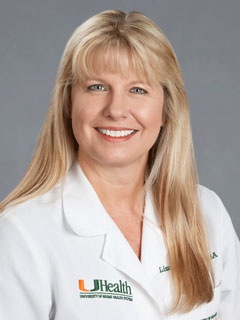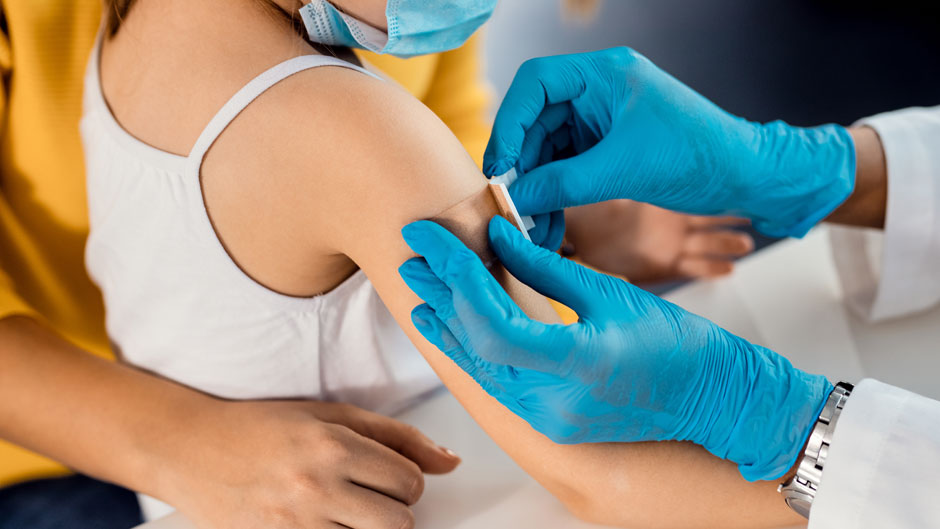With two of the largest COVID-19 vaccine production companies now testing their inoculations for children, and one on the brink of offering its vaccine to teens, pediatricians at the University of Miami want parents to make sure their kids are updated on their required immunizations, so that they are ready for the injection as soon as it is available.

Dr. Lisa Gwynn, interim chief of the Division of Child and Adolescent Health at the Miller School of Medicine and Dr. Brandon Chatani, assistant professor in the Department of Pediatrics and the Division of Pediatric Infectious Diseases, both recognize that many parents have shied away from doctors’ offices during the COVID-19 pandemic. And there’s data to back up that fact. In 2020, according to health insurance provider Blue Cross and Blue Shield, 40 percent of parents said their child missed routine shots because of the ongoing pandemic. But Gwynn and Chatani agree it’s time that parents make sure their kids catch up on their regular immunizations.
“Go ahead and schedule that pediatrician’s visit before this school year ends, so if it becomes available late this summer [or early fall], you can get your child the COVID-19 vaccine and not be out of date on all the other vaccines,” Chatani said.

The U.S. Centers for Disease Control is also asking parents to get their children back to the pediatrician for annual check-ups and shots. Gwynn said that the sooner kids get their required shots, the faster they will be eligible for the COVID-19 vaccine because it must be taken two weeks apart from other shots.
“Soon kids 12 and up will be able to get vaccinated against COVID-19, but they cannot get immunized for [two different things] at the same time, so it will cause some logistical problems if people wait on getting their annual vaccines,” she added.
Their urgency comes amid a small but growing anti-vaccine sentiment among parents that is worrying doctors across the nation, according to Gwynn, who was recently appointed president of the Florida chapter of the American Academy of Pediatrics (AAP). Both physicians touted the many benefits that vaccines have brought to the public and pointed out that without these shots, diseases like polio, mumps, measles, hepatitis, and whooping cough may become a major problem again—on top of COVID-19.
“Especially in South Florida, with . . . the amount of people that travel through here from across the world, if parents do not get their children vaccinated we are going to see a resurgence of these diseases in our area and in other heavily-traveled areas, like Orlando,” Gwynn said. “We could see more measles outbreaks and more kids coming in with mumps, and these are dangerous diseases that could be fatal.”
Gwynn is also director of the University’s Pediatric Mobile Clinic that delivers care and vaccines to thousands of uninsured children at schools and community centers in Miami-Dade County. The clinic is also starting a new program this summer called Shotz-2-Go to deliver school-required vaccines to kids. Gwynn noted that a host of harrowing conditions are no longer infecting children because of vaccines.
“The data has been clear—vaccines have been studied for decades and they have been rendered safe,” she said, referring to the schedule most pediatricians follow with their patients. “There’s always going to be side effects, but they impact a very minute subset of the population and the benefits outweigh the risks exponentially.”
Considering the success of other immunizations, Gwynn emphasized that adults should not hesitate from getting a COVID-19 vaccine today, especially since it can protect their children.
“The fact that we are in the middle of a pandemic, where millions of people are dying and many people are refusing to have a vaccine to save their lives, is extremely concerning to many of us in the medical field,” she said.
As far as COVID-19 in children, the symptoms have not changed much, Chatani indicated. Those with symptoms often have abdominal pain, fever, and a headache—fewer have respiratory symptoms, but a large number of children with COVID-19 have no symptoms at all.
Still, that doesn’t mean children are not getting COVID-19. According to the AAP, Florida ranks third in the nation for the total number of COVID-19 cases in children since the pandemic began. Overall, during the period of April 15 through April 22, children represented 20 percent of new COVID-19 cases in the United States, a recent AAP report revealed. The Florida Department of Health’s most recent report indicated that 16 percent of children tested in Broward County were positive for COVID-19 and 17.9 percent of children in Miami-Dade County also tested positive.
To test your child for COVID-19, parents can make appointments with the Pediatric Mobile Clinic by calling 305-243-2059. To make an appointment with the Pediatric Mobile Clinic for an annual check-up or free immunizations for your child, call 305-243-6407.

